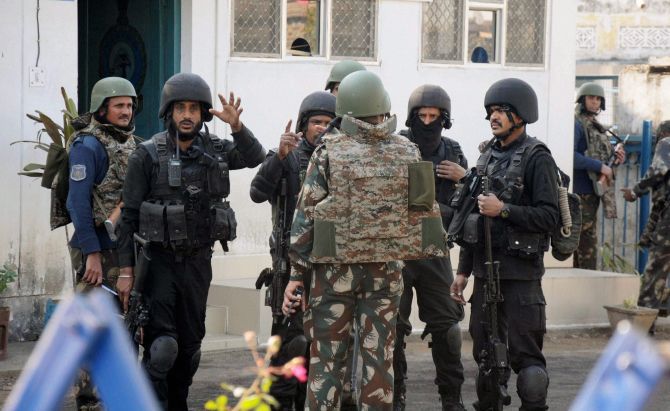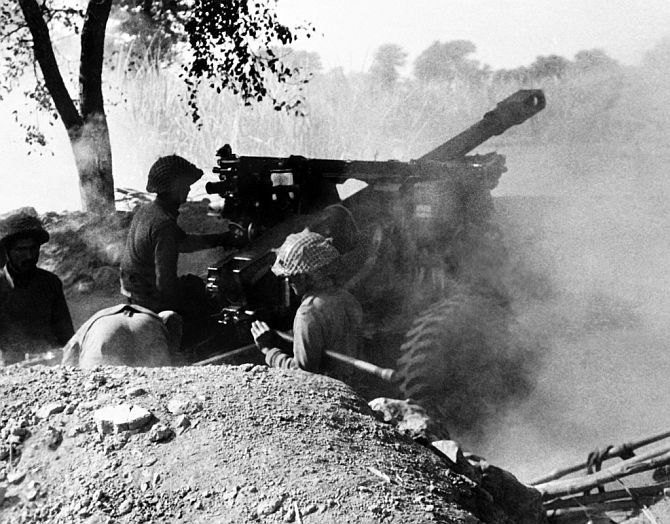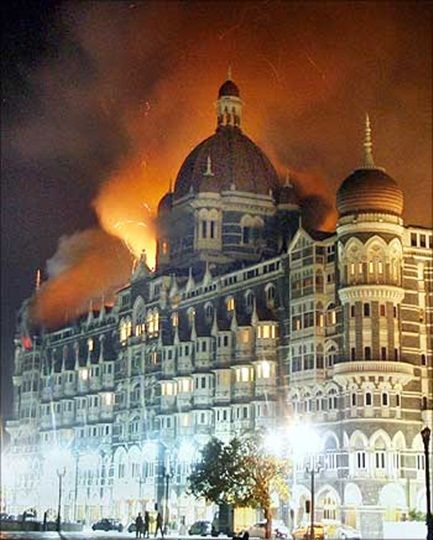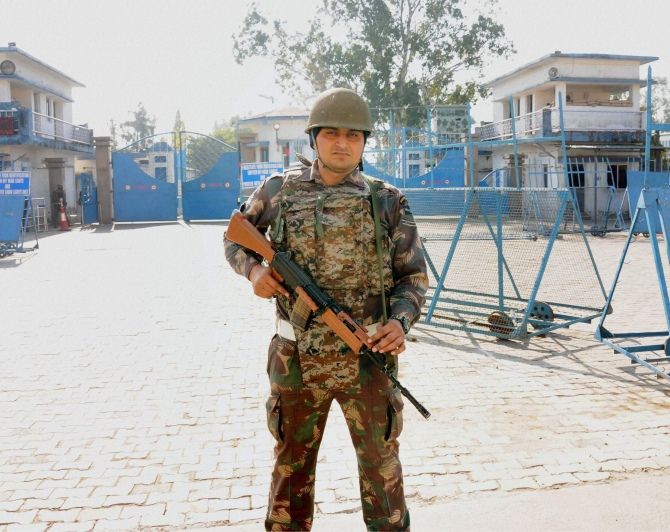 | « Back to article | Print this article |
'If you destroy the assets in Pathankot, you degrade the combat potential of India; you degrade the war potential of India.'
'There must be some understanding between the Pakistan army and Pakistan air force. After all, who can give information about the Pathankot Air Force station better than the Pakistan air force itself?'
'I can tell you today that the next attack will again come at a place in close proximity to Jammu,' says Lieutenant General D B Shekatkar (retd).

Why is Punjab a vulnerable target?
Punjab has become a soft belly of the Indian geographical area. Firstly, the alertness has gone down drastically. Drug smuggling has been on the rise, so people are more concerned about drug smuggling and less on the terrorism aspect.
Sometimes they think these are drug smugglers, not realising that they could be terrorists also. There is shift in the focus.
Secondly, so far, the whole nation's concentration was towards Kashmir without realising that we have fought terrorism in Punjab and we got it back from the hands of terrorists.
Thirdly, if Punjab becomes unrestful, it will impact Himachal Pradesh as well as Kashmir because the transit routes pass through Punjab.
Punjab also has a tremendous concentration of the army, and now, of course, the air force in Pathankot. The best way to keep the army engaged is to create problems.
Finally, there seems to be some sort of political rivalry. The aim also seems to be to let down somebody. These factors combined together are worse for any state in India, especially ones that are adjoining Pakistan.
In India barring five states -- Haryana, Delhi, Jharkhand, Chhattisgarh, Madhya Pradesh -- all other states have borders with neighbouring countries or the ocean/sea.
Unfortunately, we have never taken the state governments into confidence about threats emanating from across the border. Like from the Maoists in Nepal, Bangladeshis, Sri Lankans or from Pakistan.
Gujarat, Rajasthan, Punjab, Kashmir -- these states on the western front -- face Pakistan. Can you ever recall that they have ever called the chief ministers, chief secretaries, director generals of police from theses states -- all of them together and discussed issues pertaining to security?
Can any government official recall doing this in the last 50 years? You might meet them individually which means there is no coordinated effort and every state is looking into its own affairs.
This is not a good thing when you know that your enemy number one -- and you are not calling it the enemy -- is Pakistan. The Pakistani army, prime ministers have officially said that India is the only threat to them in the entire world.
So when you have such mentality of the government and administration, you have to be 200% careful. Your intelligence network does not have to work within your own country, but needs to be strengthened across the country.
Our intelligence set-up should not only reach Pakistan, but to the border of Pakistan with Afghanistan. Unfortunately, our focus has always been on internal intelligence. The type of intelligence that is given to the state governments is very vague and that is what is happening with R&AW (Research and Analysis Wing) and IB (Intelligence Bureau). They are never ever specific. This vagueness is killing us today.
These two intelligence agencies spy on vagueness and will never be specific.
We are failing in actionable intelligence where somebody can react to immediately. If you want actionable intelligence, you have to infiltrate these organisations.
Why was the army not tasked to secure the perimeter of the Pathankot airbase in spite of a large army presence nearby?
The first indication was that the SP's car was taken away. They should have immediately have alerted the patrolling parties that this car is likely to come and there could be another car.
The Defence Security Corps personnel, who guard the Pathankot airbase, are retired from the army. There is nothing wrong with that, but their alertness cannot match a young terrorist's.
Secondly, the air force deploys them as a normal sentry and not to counter terrorism.
There is a need for us to ensure that all airports and airbases located in close proximity to the Punjab border with Pakistan must be guarded heavily.
There seems to be too much of compartmentalisation in our thinking and that is impacting our security preparedness.
The security mechanism should be comprehensive and integrated. You can't say it's R&AW's job to see across the border and IB's to see inside. This compartmentalisation is going to kill us.
The Pathankot airbase runs in a 25 kilometre radius. How do you do parameter fencing? They can carry out mobile vehicle-based patrolling.
There are two army divisions in proximity to Pathankot. Did anyone use them? The army couldn't have come on its own. They have to be requisitioned. Even within the defence mechanism, there is a need for more coordination and synchronisation.

Why Pathankot?
In the 30 kilometres radius of Pathankot, there are large installations of the army and air force. There is huge amount of ammunition stocked around Pathankot which is kept in readiness for war.
Both in the '65 and '71 wars, Pakistani aircraft attacked Pathankot. It was the first target on December 3 when the '71 War started.
Pathankot will always be a target of Pakistan because it is the base to sustain operations in Pakistan. All sorts of weapons, equipment and aircraft are kept there.
It is the mother base to feed Kashmir as well as Ladakh and takes care of Pakistan.
I am not criticising anybody, but there is need for further sensitivity from the commanders stationed there. They should be equally concerned about it.
Secondly, Pathankot is already a target and happens to be part of Punjab that adjoins Pakistan Punjab where the writ of people like Hafiz Sayeed runs.
Just 60 kms from Pathankot are places like Narowal, Muridke and Bahawalpur which are hotbeds of terrorist organisations.
It is not difficult for people to mix along with the people from across the border because they speak the same language. That becomes a greater challenge for security personnel including the army and air force. Have we ever taken this into account?
So there is a flaw somewhere and lastly, they know Pathankot will always emotionally and psychologically make more impact than Jammu or any place else.
Every time there has been a war between India and Pakistan, Pathankot was the main hub.
A similar attack took place a few years back in Awantipore in Kashmir where all the terrorists were killed. I don't think the kind of alertness which is required to guard against a terrorist threat was there in Pathankot in spite of the warning.
I am not trying to criticise, I belong to the same organisation, but there is need for us to rethink.
Terrorist attack or a well planned military operation?
It was a well organised, well thought of, well coordinated attack on India's sovereignty by Pakistan's military and ISI. You have seen at what level Bombay (the 26/11 attacks) was organised. My reading is that a similar thing must have been done.
There must be some understanding between the Pakistan army and Pakistan air force. After all, who can give information about the Pathankot Air Force station better than the Pakistan air force itself? They have satellite imagery and all the information available to them.
Only the Pakistan army could have provided this kind of information. Pathankot is almost hugging the border. 30 kilometres is nothing. We can fool ourselves, we should not fool our mental caliber and our common sense.
More importantly, this is not an isolated terrorist attack. The implications are totally different. If you destroy the assets in Pathankot, you degrade the combat potential of India; you degrade the war potential of India.
We must compliment the air force and those guarding this air base because if aircraft or missiles were destroyed, our ability to combat a proper war would have been degraded.
Terrorists will not think on these lines, but people who are responsible for organising the attack have. We should not fool ourselves and the nation by saying it is a terrorist attack.
The Pakistan army, ISI and the Pakistan government has outsourced terrorism to terrorist organisations against India. Terrorists have become an extension of the Pakistan army. They are being guided and directed by the Pakistan army.
Why have no lessons been learnt from past attacks?
What is happening is that our individual memories are good, but our institutional memories are very poor.
Our political institutional memories are very poor and our governing memories are very poor.
So we forget the lessons very fast. When you don't learn from history that history repeats itself and you have only yourself to condemn.
The terrorists are no longer non-State actors. They are duly supported by the Pakistan State. It is foolish to call them non-State actors. They belong to the State of Pakistan and are being financed by the State of Pakistan.
The memories of government institutions and party institutions are very poor. Forgetfulness is a disease. This disease has inflicted us for quite some time.
You can forgive a person if you are powerful, but forgetfulness depicts a disease. So we are suffering from that disease and don't want to learn from history.
Any nation which ignores intitutionalised memory has not done well in the history of humankind.
We have refused to learn from the Bombay attacks, the Parliament attack, the Akshardham attack, Kashmir attack...

Why did the government announce that the operation was a success when it continued three days after?
The objective with which terrorists came to Pathankot was not successful. They came to destroy our aircraft, missiles. Their aim was to destroy our war assets.
If they had destroyed 20 aircraft, my god how much money and time it would take to replace them.
From that point of view it was a success, but we could have said that so many people have been accounted for and the operation is continuing.
Secondly, in such situations there is a need to manage the perception of the people. They could have organised a press briefing outside the Pathakot Air Force base and deputed someone to tell the press what has happened so far and kept them posted.
When you hide the truth, people start writing fiction. Fiction is always more glamorous than fact.
It is time the Government of India concentrated on perception management. If you goof up perception management, it will destroy your image.
When the image is distorted, then you have to be ready to face the consequences and the consequences come from your own people.
The future of India-Pakistan talks
There is no harm in talking. You have to talk to those who have been authorised by the government of Pakistan. You can't talk to Hafiz Sayeed or some Islamic fundamentalist organisation.
The Government of India does not allow our army chief to speak to the Pakistan army chief. We are allergic to this. A soldier is in a better position to understand another soldier's language.
So let the NSAs, foreign secretaries talk, but when you are talking you should not talk, but speak.
There is a difference between the two. Talks are going on for the last 65 years. You must speak from a position of power, authority and convincingly.
Unless your opponent understands these consequences clearly, talks have no meaning, but talks should continue. To expect that just because there has been a dialogue between Narendra Modi and Nawaz Sharif, things will improve with Pakistan is foolish.
Sharif stays at the mercy of the Pakistan army. The day they don't want him they will throw him out again. Just like Musharraf was; the same thing happened with Benazir and when she returned and looked powerful she was killed.
Secondly, the Pakistan army, ISI and terrorist organisations would never ever like political parties to get prominence. The Pakistan army is ruling Pakistan. That doesn't mean we stop talking to Nawaz Sharif. After all, he is the constitutionally elected prime minister of Pakistan.
What is connected to this is this that when Musharraf was the army chief, the same Sharif was prime minister. Vajpayee went to Lahore and Musharraf was already launching an attack in Kargil.
These terrorists must have been prepared at least two months in advance.

Are we losing sight of the ISI's local recruits in India?
No irregular war, no terrorist attack, no insurgency, no guerilla warfare will succeed without local help. I am not saying that the people of Punjab have revolted against the Government of India, but there will be just 1% people who are against us and that is more than enough.
It is high time we focused on internal dimension of security.
There is a philosophy of warfare and national governance that in politics, international relations diplomacy and warfare to speak the truth is to commit harakiri, and today Pakistan has waged war against India.
We call it proxy war, but we are using the word war. In war, no one tells you the truth. Truth dies first in a war. You will not come to know the truth ever.
Have you come to know what happened in Kargil? No. Truth will not come out because truth is very harsh, but then in your desire to hide the truth you are harming the coming generation of India.
Unless people know the truth, they will start believing in fiction and fiction is far more dangerous that truth.
There is optimism about the prime minister's meeting, it is a good thing to be optimistic. I am not pessimistic either, but between optimism and pessimism there is realism. If you start becoming too optimistic, then you have to be ready to suffer.
We have selective memory. We should learn to forgive, but not forget.
I can tell you today that the next attack will again come at a place in close proximity to Jammu.
One attack in Paris and the (French) president went on air to say France is at war with ISIS and what are we saying? We are saying we will continue to talk and be friends.
We are suffering a proxy war and the answer to this proxy war is not a direct war, but a proxy war.
Why can't we tell the truth because nowhere in the history of the world has a proxy war, a guerilla war, ever been won by direct war. You have to combat a proxy war by proxy means.
You have to combat terrorism not by using aircraft, but by counter terrorism.
Our security agencies should be ready for counter war, you don't have to declare it. It is your outlook and they will understand. A proxy war is not that you send terrorists, there are hundreds of other means.
Future of India-Pakistan relations
I am not a pessimist. I am a realist and I don't think things will improve. The reason being that Nawaz Sharif is more concerned about keeping his body intact. It is not the politicians of Pakistan, but Pakistan as an institution which is against India.
Institution includes the Pakistan government, the army, ISI and terrorist organisations. Unless this changes, how can things improve? They will improve marginally. I don't think there will be a change of heart.
The economic dependence on the two nations will reduce the chance of conflict. We should be able to assimilate and accumulate more and more trade. Once your economic dependence increases, the chances of war will come down.
China and America don't see eye to eye, but will not fight a war because the economic stakes are very high. We have to think on those lines.
Lastly, build up the young generation and convince them that your ancestors have fought with India for 60 years without getting anything. Do you want to fight another 600 years? The youth will understand. That is the way ahead.
Lieutenant General Dr D B Shekatkar (retd), PVSM, AVSM, AVSM, fought in the 1965 War in Kashmir, the 1971 War in the Western Theatre. He also trained the Mukti Bahini before the war of liberation.
During the Kargil War the general was in charge of the entire China front in Arunachal Pradesh.
The general, who served extensively in the North East, compelled a record number (1,267) of terrorists in Kashmir, trained in Afghanistan and Pakistan to give up terrorism.
He is pursuing his third PhD on War in the 21st Century.
He spoke to Archana Masih/Rediff.com.